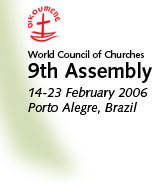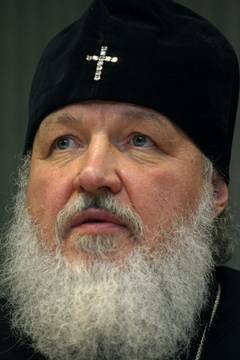 |
WCC > Home > News & media > News | ||||
| About the assembly | Programme | Theme & issues | News & media | |||||
 |
|
||||
|
16.02.06
Kyrill, Dandala: Globalized world presents faith challenges
More articles and free photos at www.wcc-assembly.info
Religious leaders from two hemispheres discussed the edges where cultures and civilizations clash during a 9th Assembly press conference Wednesday afternoon. Metropolitan Kyrill of Smolensk and Kaliningrad and Rev. Dr Mvume Dandala each noted challenges in an increasingly globalized world.
Kyrill, chairman of the Department for External Relations of the Russian Orthodox Church, said that relations between religions have been "very peaceful" in his nation, but require close attention and care to maintain that mutual respect. Kyrill said that while most of Russia is Orthodox, 10 percent is Muslim, and other religious traditions comprise another 10 percent.
He noted that an interreligious summit would be held in Russia to look at intercultural and interreligious relationships in the context of globalization, prior to the G-8 summit planned for St Petersburg in July. He commended the World Council of Churches for understanding "the importance of interreligious dialogue".
Kyrill also addressed the divide between the religious and secular worlds, noting the "most important question of the 21st century" as "whether it is possible or not to balance religious values and secular values", and pointing to the recent Danish cartoon controversy as an example. "I still have an idea that these values may be balanced," he said. "Of course, that requires very hard work, but I think it's something which may be done".
Dandala, general secretary of the All Africa Conference of Churches, said that globalization posed a major threat for his continent. "The question is asked often in Africa: does globalization have the prospect for us of the annihilation of our culture, annihilation of our languages, and so on".
He pointed to, for example, studies looking at the disappearance of languages. "When a language disappears, it often goes with the culture and heritage of a people. The question for us is very real - how do we preserve our heritage?" He said that the All Africa Conference has worked with its member churches to reflect theologically on such issues.
Dandala also noted the ability of religion to be both a positive and negative force in such situations. He said it had played a "devastating role of dividing" in apartheid, but it could also be something that "affirms people" and demonstrates that "we are all human beings and should care for one another". Diversity, he said, should be celebrated, and "what matters most today is using diversity for the enrichment of all the people".
Assembly website:www.wcc-assembly.info
|
|||
|
|
|


